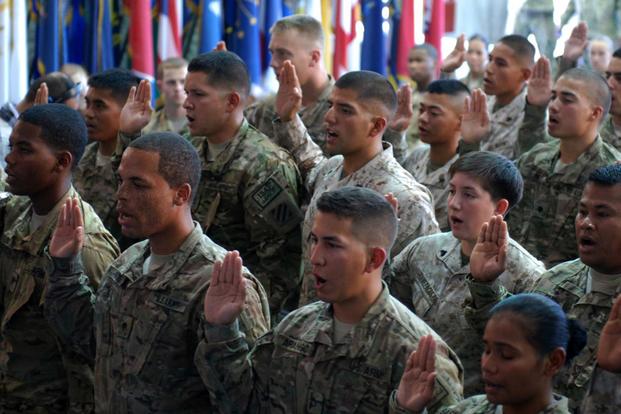A military recruitment program thrust into the spotlight by President Donald Trump's recently announced immigration reform plans is a victim of bad American immigration policy, its creator said.
"DoD has killed the program through bureaucratic bumbling," said Margaret Stock, a retired Army lieutenant colonel who created the Military Accessions Vital to the National Interest (MAVNI) program in 2008.
"The Pentagon killed the goose that laid the golden eggs ... because the Pentagon is so xenophobic right now, they view all foreigners as sort of a threat," she said.
Trump early this month ordered an end in six months to the Deferred Action for Childhood Arrival (DACA) program, an Obama-era immigration initiative.
Congress is expected to take action before the end date, and Pentagon officials said last week they are coordinating with the Departments of Justice and Homeland Security regarding the impact on about 900 military DACA recipients.
Stock, then part of the Army's military police, helped design MAVNI to assist the military in solving what she saw as a major security issue -- a lack of recruits who understand foreign culture or fluently speak foreign languages.
By tapping into a pool of highly skilled foreign nationals who wanted to become American citizens, Stock believed the Pentagon could gain recruits with much-needed language or professional skills, such as doctors.
And it worked. Among its 10,000 recruits are Spc. Paul Chelimo, a Team USA track-and-field silver medalist, and 2012 soldier of the year Sgt. Saral K. Shrestha, an expert in Urdu who served with Army Special Forces.
But in 2012, the Obama administration used the MAVNI program to address a separate problem: how to give undocumented immigrants who had been living in the U.S. since childhood, also known as Dreamers, a path to citizenship by joining the military while enrolled in DACA.
In the wake of that decision, the DoD changed the way MAVNI operated, requiring additional security screenings for those waiting in the MAVNI pipeline and creating a substantial backlog.
In 2016, the Pentagon effectively shuttered the program, closing applications and stalling those recruits who had already started the process.
About 360 DACA applications are waiting in the MAVNI pipeline, Stock said. The fate of those users could depend on what, if any, action Congress takes before DACA's ordered expiration date.
The decision to pair MAVNI with DACA sounded the death knell for the program, Stock said, because MAVNI was never intended as way to address the political hot potato of citizenship for undocumented long-term residents.
"They made a colossal error, frankly," she said. "Instead of trying to recruit the DACAs separately, they tried to shove the DACAs into the MAVNI program. And that wrecked both programs."
That's because MAVNI sought candidates with hard-to-fill specialties, such as licensed medical professionals, or highly sought language skills.
DACA candidates rarely meet those qualifications, either because they are undocumented or because they have been in the U.S. so long.
"There are DACAs that speak the strategic languages, but there aren't thousands of them," Stock said.
-- Amy Bushatz can be reached at amy.bushatz@military.com.



























